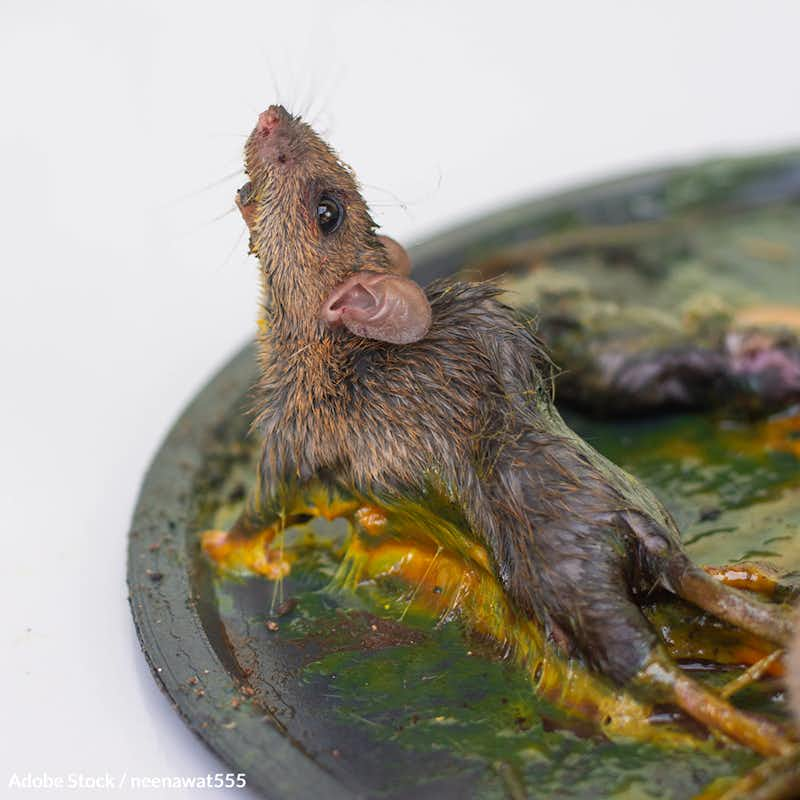Ban Glue Traps in the U.S.
29,059 signatures toward our 50,000 Goal
Sponsor: The Animal Rescue Site
Glue traps are indiscriminate and inhumane torture devices that have led animals to chew through their own limbs. Take a stand!

Glue traps cause horrific pain and suffering to any animal that comes in contact with them1.
These traps are often pieces of cardboard, plastic, or fiberboard coated with a strong non-setting adhesive, designed to immobilize animals who wander across them. Once stuck in the trap, it can be days before an animal succumbs to death via dehydration and starvation2.
Animals stuck in glue traps have been known to tear off, or bite through, their own limbs in an attempt to free themselves. They can suffer from broken or dislocated bones, torn skin, suffocation, vision loss, or if left long enough, dehydration or starvation3.
It's not just rats and mice who fall victim to glue traps, either. Protected and endangered species including hedgehogs, birds, bats, and pet cats have also been known to sustain injuries, many of which are fatal4.
"Small mammals, birds, reptiles, and amphibians that fall victim to these products invariably suffer terrible distress and often painful deaths," says Winnipeg veterinarian Dr. Jonas Watson1. "And an animal's efforts to free itself typically causes them to become further adhered."
These "Inhumane, indiscriminate and indefensible" glue traps have already been banned in England, following a unanimous vote in the House of Lords6.
"Glue traps are crude devices that cause horrific suffering to millions of animals," said Claire Bass, executive director of Humane Society International/UK6. "It is absolutely right that their public use will be banned, and we hope this will precipitate their removal from sale by retailers since it will be illegal for their customers to use them. It is immoral to subject small, sentient wildlife to being immobilized on these sticky boards, only to suffocate in the glue, die slowly of their injuries, or be ineptly killed by unprepared members of the public who resort to drowning or throwing them in the rubbish while still alive."
No creature deserves this fate, yet glue traps are still being used in the United States when humane alternatives are available. Sign the petition and help us ask the US Department of Agriculture to ban these awful traps!
- Jessica Scott-Reid, CBC (26 May 2019), "Glue traps are heinously cruel. Retailers should be banned from selling them."
- Jemima Webber, Plant Based News (26 April 2022), "England To Ban Glue Traps In 'Momentous Victory' For Wildlife."
- Humane Society International, "Inhumane Indiscriminate Indefensible: The Case for a UK Ban on Rodent Glue Traps."
- Alice Soule, The Vegan Review (17 May 2022), "A ban on glue traps in England."
- Humane Society International (26 April 2022), "Inhumane rodent glue traps to be banned in England following unanimous vote in House of Lords."
The Petition:
To the United States Department of Agriculture,
Glue traps are an antiquated and crude form or pest control that cause horrific suffering to millions of animals.
Animals stuck in glue traps have been known to tear off, or bite through, their own limbs in an attempt to free themselves. They can suffer from broken or dislocated bones, torn skin, suffocation, vision loss, or if left long enough, dehydration or starvation.
It is immoral to subject small, sentient wildlife to being immobilized on these sticky boards, only to suffocate in the glue, die slowly of their injuries, or be ineptly killed by unprepared members of the public who resort to drowning or throwing them in the rubbish while still alive.
No creature deserves this fate. Humane alternatives are available, and while England has already moved to ban the sale and use of these traps, glue traps are still being used in the United States.
I hereby ask that you ban the sale and use of glue traps in the U.S. and protect the lives of countless animals.
Sincerely,